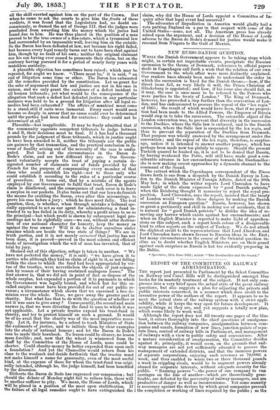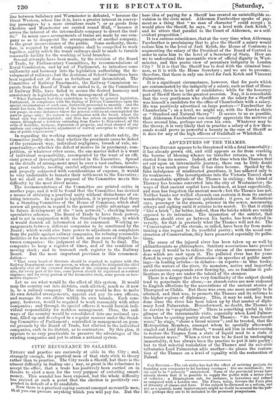REPORT OF THE COMMITTEE ON RAILWAY ADMINISTRATION.
THE report just presented to Parliament by the Select Committee on Railway and Canal Bills will be distinguished amongst blue
books for its masterly treatment of the subject. It not only com- presses into a very brief space the actual state of the peat railway questions, but also suggests a plan for adjusting the private and public interests concerned, in a manner which does credit to the inventive power of the authors of the report. It appears to us to meet the actual state of the railway system with a strict appli- cability, while it keeps the way open for future development. It accepts things as they are, and yet suggests a totally new plan, which seems likely to work well. Although the report does not fill twenty-one pages of the blue book, it enters thoroughly into the chief questions of amalgama- tion between the railway companies, amalgamation between com- panies and canals, formation of new lines, junction-points of sepa- rate lines, control of railway bills in Parliament, and management of railways with a view to public safety and convenience. After a mature consideration of amalgamation, the Committee decides against it; principally, it would seem, on the grounds that rail- way managers are not yet sufficiently educated to possess the management of extended districts, and that the immense powers of separate corporations, enjoying such revenues as 70,0001. a week, and thus enabled to waste two or three thousand pounds a week in crippling rivals, would be to augment powers already abused for corporate interests, without adequate security for the public. "Running powers "—the power of one company to run carriages on the line of another—which are theoretically prao- ticable, are defeated by the perversity of railway managers, and are productive of danger as well as inconvenience. Yet some security is necessary against the devices by which great companies prevent the completion or working of lines required by the public ; as the
line between Salisbury and Warminster is defeated, " beeause the Great Western, whose line it is, have a greater interest in convey- ing passengers by a more circuitous route "; or as goods from Cheshire and Manchester are carried round Hull, "because it serves the interest of the intermediate company to divert the traf- fic." In many cases arrangements of trains are made by one com- pany so as to disappoint the arrangements of another company, to the great inconvenience of the public. Some authority, there- fore, is required by which companies shall be compelled to work together, and by which the trunk railways shall be made to furnish reasonable facility for the working of local branches. Several attempts have been made, by the revision of the Board of Trade, by Parliamentary Committees, by recommendations of Royal Commission, and by act of Parliament, to introduce some uniformity and harmony into the legislation authorizing the de- velopment of railways; but the decisions of Select Committees have been regarded out of doors as fortuitous and inconsistent. The Committee of Railway Enactments, the Railway Commission se- parate from the Board of Trade or united to it, or the Committees of Railway Bills, have failed to secure the desired harmony and consistency in legislation, or in the management of lines.
"What Parliament had thus undertaken to settle by general legislation, Parliament, in compliance with the finding of Private Committees upon the special circumstances of each case, forthwith proceeded to unsettle : and the result has been, the construction of the broad in combination with the nar- row gauge, in some instances where the general settlement contemplated the narrow gauge only ; the narrow in combination with the broad, where the broad only was contemplated ; and thus has arisen an uncertainty which causes, throughout a territory extending from Exeter to Birkenhead, all the evils of hostility, intrigue, depression of property, and total absence of any uniform and comprehensive adjustment of railway enterprise to the exigen- cies of public requirement."
In regarding the working management as it affects safety, the Committee justly show, that whether the proximate cause be defect of the permanent way, individual negligence, breach of rule, un- punctuality,—whether the defect of motive lie in parsimony, com- petition, or whatever other cause, the one master defect is a want of individual responsibility, accompanied by the want of an effi- cient power of investigation or control in the Executive. Spread as the details of arrangement must be over a vast surface, involv- ing great variety, needing careful adjustment to circumstances, and properly connected with considerations of expense, it would be very undesirable to transfer their settlement to the Executive ; but we shall see that the proposal of the Committee meets this difficulty by the most direct means.
The recommendations of the Committee are printed entire in another page, and it will be found that the Committee has devised a means of attaining a practical unity without disturbance of ex- isting interests. In regard to legislation, it is proposed that there be a Standing Committee of the House of Commons, which shall review all projects in regard to the general public advantage and to future development of the "iron network"; checking merely speculative schemes. The Board of Trade to have fresh powers, and to act in conjunction with the Standing Committee, to which it would furnish all information at its command. Working ar- rangements between different companies to be sanctioned by the Board ; which would also have power to adjudicate on complaints from the public against railway companies, for refusing reasonable facilities or for non-observance of law, and on cases of dispute be- tween companies ; the judgment of the Board to be final. The companies to keep a register of times, and of the condition of moving stock ; and to transmit such register to the Railway Board. But the most important provision is this recommen- dation— " That every board of directors should be required to register with the Railway Department some one person, to whom should be delegated the chief authority over all the external discipline of the company and its servants ; also, for every part of the line, some person should be registered as resident engineer, and for every portion of the locomotive stock, some person as loco- motive engineer."
Let us see what would be the effect of this system. It would map the country out into districts, each allotted, much as it now is, to a railway company. The company would be free to make its own detailed arrangements, appoint and pay its own officers, and manage its own affairs within its own bounds. Each com- pany, however, would be required to work reasonably with other companies; and through its special officers it would furnish indi- vidual responsibility for reckless management. Thus, the rail- ways of the country would' be consolidated into one national sys- tem, filled up and developed in a regular manner under the Stand- ing Committee of Parliament ; controlled in management on gene- ral grounds by the Board of Trade, but allotted to the individual companies, each in its district, as to contractors. By this plan, it appears to us very practicable to preserve the advantages of the existing companies and yet to attain a national system.



























 Previous page
Previous page